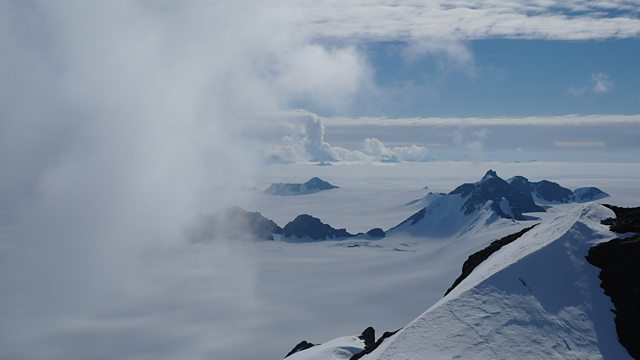
Antarctic Ice Melt
Antarctic ice melt; Hip Impingement; e-Waste; Earthquake prediction; Male anatomy; The exercise of singing; Musical tastes.
Antarctic ice melt
The rate of sea level rise from melting ice sheets and ice shelves in Antarctica has trebled in the past 5 years due to global warming. Satellite data is showing that ice loss from Antarctica has increased global sea levels by 7.6mm since 1992 and could reach 15 cm by the end of the century. Andy Shepherd from IMBIE, which stands for Ice-sheet Mass Balance Intercomparison Exercise, talks to Roland Pease about the problem.
Hip Impingement
The World Cup has started and one condition that tends to affect one or two footballers in each squad is Femoroacetabular impingement syndrome or “hip impingement syndrome”. We are born with a round ball in a round socket, but sometimes the ball becomes more egg-shaped or is not perfectly round, which means it can jam in the socket. One option is physiotherapy, surgery is another, but it is a major operation and has a long recovery time. So Damian Griffin, Professor of Trauma and Orthopaedic Surgery at the University of Warwick and an international team have been developing a new keyhole surgery technique. He spoke to Claudia Hammond about it.
e-Waste
China is exporting 20,000 tonnes of electronic waste to Nigeria every year, according to a new study. This is the first time that e-waste has been traced from Asia to Africa. Researchers monitored two ports in Lagos and found that almost 70% of the e-waste reaching Lagos arrived inside vehicles destined for Nigeria's second hand auto market. Professor Percy Onianwa from the Basel Convention Coordinating Centre for Africa spoke to Gareth Mitchell about the problem.
Earthquake prediction
Earth scientists can’t forecast earthquakes but they can give generalised forecasts. The simplest approach has always been to look at what’s happened in the past. Nowadays, because we know earthquakes mostly (but not uniquely) happen where the Earth’s plates grind against each other, maps of plate motions can show where the danger is building up most. Thousands of GPS stations have made those maps very accurate. Ross Stein, founder of the quake awareness foundation TEMBLOR, has been backing a model called GEAR – the Global Earthquake Activity Rate model and this week, we’ve been able to see the forecast of quake activity made in 2015 and to compare it with what’s actually happened since. He spoke to Roland Pease.
Male anatomy
A German urologist called Dr Oliver Gralla is determined that men should become more comfortable with talking about their penises. His new book “Happy Down Below” was prompted by some of the more unusual cases he came across whilst working night shifts in the emergency room. He spoke to Claudia Hammond.
"The exercise of singing is delightful to nature, and good to preserve the health of man". Four hundred years ago the English Composer, William Byrd, knew something that researchers working in the 21st century have now confirmed with evidence; that singing is good for our health, both mentally and physically. The latest findings were on display at the National Centre for Early Music in York in the North of England. Jack Meegan went to find out more.
What Shapes Our Musical Taste?
What sounds heavenly to one person might sound like boring noise to another - but why are our musical preferences so different? Marnie Chesterton asks Dr Catherine Loveday, a Principal Lecturer in Cognitive Neuroscience at the University of Westminster, about what influences our musical tastes.
The Science Hour was presented by Claudia Hammond with comments from Clare Wilson from the New Scientist.
Producer: Katy Takatsuki
(Photo: Summer clouds swirl in around the Staccato Peaks of Alexander Island, Antarctic Peninsula. High snowfall and strong weather gradients in this mountainous area make assessment of glacier mass balance particularly challenging. Credit: Hamish Pritchar)
Last on
More episodes
Previous
Broadcast
- Sat 16 Jun 2018 11:06GMT���˿��� World Service Americas and the Caribbean
Podcast
-
![]()
Unexpected Elements
The news you know, the science you don't

